An American doctor is receiving intensive medical treatment in Liberia after he was infected with the deadly Ebola virus while treating patients in the West African nation, a spokeswoman for an aid organisation said on Sunday.
Dr Kent Brantly was in stable condition, talking with his doctors and working on his computer while receiving care at a hospital in the Liberian capital of Monrovia, said Melissa Strickland, a spokeswoman for North Carolina-based Samaritan's Purse.
Strickland cautioned that Brantly is "not out of the woods yet”. She said patients have a better chance of survival if they receive treatment immediately after being infected, which Brantly did.
Brantly, 33, has been working with Samaritan's Purse in Liberia since October 2013 as part of the group's post-residency programme for doctors, Strickland said. He is the medical director for the aid organisation's case management centre in the city.
The website for Samaritan's Purse said Brantly had worked as a family practice physician in Fort Worth, Texas.
The highly contagious Ebola virus is one of the most deadly diseases in the world. Photos of Brantly working in Liberia show him in white coveralls made of a synthetic material that he wore for hours a day while treating Ebola patients.
Brantly was quoted in a posting on the organisation's website earlier this year about efforts to maintain an isolation ward for patients.
"The hospital is taking great effort to be prepared," Brantly said. "In past Ebola outbreaks, many of the casualties have been healthcare workers who contracted the disease through their work caring for infected individuals."
Strickland says that Brantly's wife and children had been living with him in Africa, but they are currently in the US. A woman who identified herself as Brantly's mother answered a US phone listing for him, but said family members are declining comment at this time.
The deadly disease has killed at least 672 people in several African countries since the outbreak began earlier this year. A government official said on Sunday that one of Liberia's most high-profile doctors has died of Ebola, highlighting the risks facing health workers trying to combat the deadly disease.
Dr Samuel Brisbane is the first Liberian doctor to die in an outbreak the World Health Organisation says has killed 129 people in the West African nation. A Ugandan doctor working in the country died earlier this month.
Last week a Liberian man died of Ebola in the Nigerian city of Lagos, the first confirmed case in Africa's biggest city of 21 million people.
Nigerian health authorities, anxious to stop the spread of the disease, are concerned that the sick man had boarded an international flight. Officials in Togo, where the sick man's flight had a stopover, also went on high alert after learning that Ebola could possibly have spread to a fifth country.
An Ebola outbreak in Lagos, where many live in cramped conditions, could be a disaster. Nigerian newspapers describe the effort as a "scramble" to contain the threat after the Liberian arrived in Lagos and then died on Friday.
International airports in Nigeria are screening passengers arriving from foreign countries for symptoms of Ebola, said Yakubu Dati, a spokesman for the Federal Aviation Authority of Nigeria.
Airports in Guinea, Liberia and Sierra Leone, the three other West African countries affected by the outbreak, have implemented some preventive measures, according to officials in those countries. But none of the safeguards is foolproof.
Doctors say health screens could be effective, but Ebola has a variable incubation period of between two and 21 days and cannot be diagnosed on the spot.
Patrick Sawyer, a consultant for the Liberian ministry of finance, arrived in Nigeria on Tuesday and was immediately detained by health authorities suspecting he might have Ebola.
Authorities announced on Friday that blood tests from the Lagos University teaching hospital confirmed Sawyer died of Ebola earlier that day. Sawyer reportedly did not show Ebola symptoms when he boarded the plane.
Nearly 50 other passengers on the flight are being monitored for signs of Ebola but are not being kept in isolation, said an employee at Nigeria's ministry of health, who insisted on anonymity because he was not authorised to speak to the media.
Sawyer's sister also died of Ebola in Liberia, according to Liberian officials, but Sawyer claimed to have had no contact with her.
Ebola is highly contagious and kills more than 70% of people infected. It is passed by touching bodily fluids of patients even after they die.
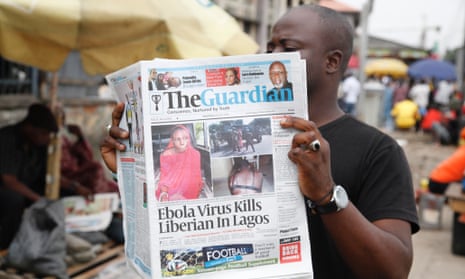
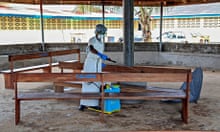
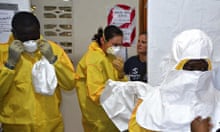
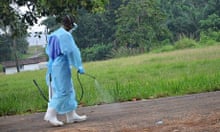
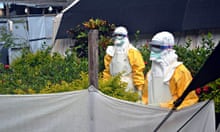

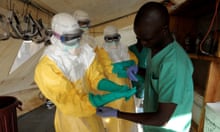
Comments (…)
Sign in or create your Guardian account to join the discussion